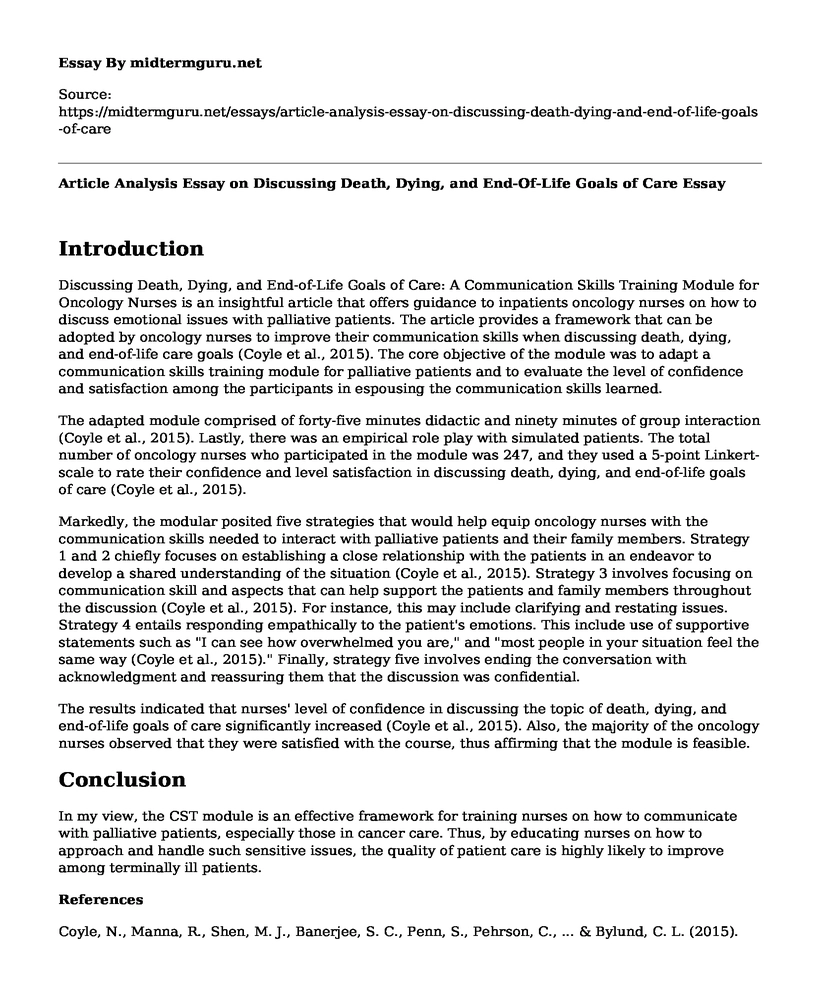Introduction
Discussing Death, Dying, and End-of-Life Goals of Care: A Communication Skills Training Module for Oncology Nurses is an insightful article that offers guidance to inpatients oncology nurses on how to discuss emotional issues with palliative patients. The article provides a framework that can be adopted by oncology nurses to improve their communication skills when discussing death, dying, and end-of-life care goals (Coyle et al., 2015). The core objective of the module was to adapt a communication skills training module for palliative patients and to evaluate the level of confidence and satisfaction among the participants in espousing the communication skills learned.
The adapted module comprised of forty-five minutes didactic and ninety minutes of group interaction (Coyle et al., 2015). Lastly, there was an empirical role play with simulated patients. The total number of oncology nurses who participated in the module was 247, and they used a 5-point Linkert-scale to rate their confidence and level satisfaction in discussing death, dying, and end-of-life goals of care (Coyle et al., 2015).
Markedly, the modular posited five strategies that would help equip oncology nurses with the communication skills needed to interact with palliative patients and their family members. Strategy 1 and 2 chiefly focuses on establishing a close relationship with the patients in an endeavor to develop a shared understanding of the situation (Coyle et al., 2015). Strategy 3 involves focusing on communication skill and aspects that can help support the patients and family members throughout the discussion (Coyle et al., 2015). For instance, this may include clarifying and restating issues. Strategy 4 entails responding empathically to the patient's emotions. This include use of supportive statements such as "I can see how overwhelmed you are," and "most people in your situation feel the same way (Coyle et al., 2015)." Finally, strategy five involves ending the conversation with acknowledgment and reassuring them that the discussion was confidential.
The results indicated that nurses' level of confidence in discussing the topic of death, dying, and end-of-life goals of care significantly increased (Coyle et al., 2015). Also, the majority of the oncology nurses observed that they were satisfied with the course, thus affirming that the module is feasible.
Conclusion
In my view, the CST module is an effective framework for training nurses on how to communicate with palliative patients, especially those in cancer care. Thus, by educating nurses on how to approach and handle such sensitive issues, the quality of patient care is highly likely to improve among terminally ill patients.
References
Coyle, N., Manna, R., Shen, M. J., Banerjee, S. C., Penn, S., Pehrson, C., ... & Bylund, C. L. (2015). Discussing death, dying, and end-of-life goals of care: a communication skills training module for oncology nurses. Clinical journal of oncology nursing, 19(6), 697.
Cite this page
Article Analysis Essay on Discussing Death, Dying, and End-Of-Life Goals of Care. (2023, Jan 27). Retrieved from https://midtermguru.com/essays/article-analysis-essay-on-discussing-death-dying-and-end-of-life-goals-of-care
If you are the original author of this essay and no longer wish to have it published on the midtermguru.com website, please click below to request its removal:
- Essay on the Impact of Supreme Court Decision on the Affordable Care Act
- The Health Problem for the Population - Paper Example
- The Nursing Issue to be Presented - Research Paper
- Foster Care: Temporary Care for Children in Need - Research Paper
- Social Work: Assisting Individuals to Improve Wellbeing - Essay Sample
- Living a Healthy Lifestyle: A Necessity for a Healthy Life - Essay Sample
- Diagnosis and Management of Respiratory Disorders Cardiovascular, and Genetic Disorders







